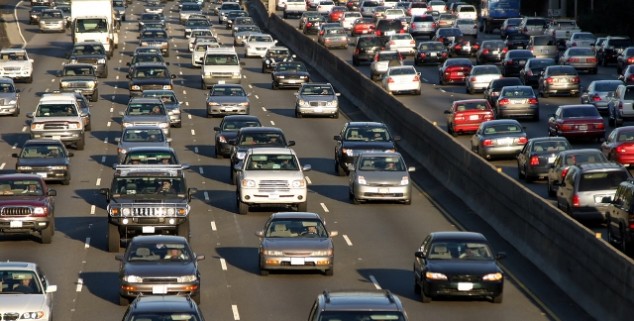News
DMV, Judicial Council hit over fees
 California drivers in a Los Angeles traffic jam.(Photo: ShutterStock)
California drivers in a Los Angeles traffic jam.(Photo: ShutterStock)A motorist who faced more than $1,600 in fines for a traffic violation is suing the Department of Motor Vehicles and the state Judicial Council in federal court, contending that millions of California drivers had their licenses suspended illegally because they were unable to pay spiraling fees.
“Traffic courts in California routinely impose exorbitant penalty assessments, fines and fees on all traffic court cases over and above the statutory fines” required for public safety, says Howard Herships of Sacramento, who authored the pending suit. “The exorbitant fines and fees are done for one purpose, and one purpose only, to fund the day-to-day operations of the courts in California,” he says.
Fines “are not geared toward public safety but rather toward raising revenue”
Hundreds of millions of dollars are raised for the court system through fees, penalties and other charges — $858 million in 2013-14, by one estimate — and several billion dollars over five years. The amount of fees owed the state but which go uncollected was about $11.2 billion, according to a January 2016 report by the Legislative Analyst’s Office.
The suit, which is expected to be filed next week in U.S. District Court in San Francisco, stems partly from a March 14, 2016, “Dear Colleagues” letter from the U.S. Justice Department to members of the judiciary across the country. Capitol Weekly reviewed copies of the pending suit and the nine-page letter.
The letter from the Department’s Civil Rights Division and Office for Public Access said that “recent years have seen an increased attention on the illegal enforcement of fines and fees in certain jurisdictions around the country,” often for misdemeanors and civil infractions.
“Typically, courts do not sentence defendants to incarceration in these cases; monetary fees are the norm,” the letter noted, adding that when the fines “are not geared toward public safety but rather toward raising revenue, they can cast doubt on the impartiality” of the judicial system.
The suit names the DMV for its role in regulating vehicles and its administrative procedures, as well as the Judicial Council, which administers California’s court system.
The document said the courts should not order someone jailed for non-payment, without first holding an indigency hearing and determining the failure to pay was willful. For those who can’t pay, courts should consider alternatives. Courts also should be wary of fee-collections by third party contractors, the Justice Department wrote.
The lawsuit contends that millions drivers whose licenses were suspended did not receive ability-to-pay hearings before their licenses were yanked. Herships asked the federal court to order a halt to the practice and require the state to hold ability-to-pay hearings for those facing fines and enforcement actions.
In Herships’ case, his license was lifted after failing to pay $1,665 in costs for a traffic violation — $200 for the original fine, plus $1,465 in penalty assessments. Herships, 73, who lives on a limited income, said the loss of license amounts to a lifetime driving suspension.
The suit names the DMV for its role in licensing and its administrative procedures, as well as the Judicial Council, which is headed by the chief justice of the Supreme Court and administers California’s court system.
During a recent amnesty period, “more than 175,000 Californians received amnesty fine and fee reductions and more than 153,000 Californians had their suspended driver’s licenses reinstated”
Meanwhile, a California lawmaker in an unrelated move introduced legislation this week targeting the same issue.
The bill, SB 185 by state Sen. Bob Hertzberg, D-Van Nuys, would “prevent the automatic suspension of driver’s licenses for people who are unable to pay fines or fees for minor traffic tickets and require courts to determine violators’ ability to pay before setting fine amounts,” his office said.
In an earlier amnesty program authored by Hertzberg and signed by Gov. Brown, “more than 175,000 Californians received amnesty fine and fee reductions and more than 153,000 Californians had their suspended driver’s licenses reinstated” during the first nine months, his office said, citing Judicial Council figures. Click here for Capitol Weekly’s 2015 story on the issue.
Hership’s lawsuit notes that several years ago, a class action challenged the DMV’s procedures and the department wound up paying $5.6 million to settle case involving 573 drivers.
But there are an estimated 4.2 million drivers who had licenses suspended from 2006 to 2013. During the same period, only about 71,000 driver licenses were reinstated.
There was no immediate comment from the DMV or the Judicial Council.
Want to see more stories like this? Sign up for The Roundup, the free daily newsletter about California politics from the editors of Capitol Weekly. Stay up to date on the news you need to know.
Sign up below, then look for a confirmation email in your inbox.

It’s horrible when the government funds itself with fines and fees if it’s in Ferguson but fine when Democrats in California do it to the citizens of this state.
Ignorance is bliss. The courts are ridiculously underfunded. They are funded through the general state budget. The vast majority of civil assessments and fees go to the general fund and most of it does not go back into funding the courts. You try running a large county superior court on $2.5-3 million. It’s not even close to being enough. People are being laid off, benefits are being cut and many courts are still using 90s technology. Literally running systems on Windows XP.
Ask me how I know.